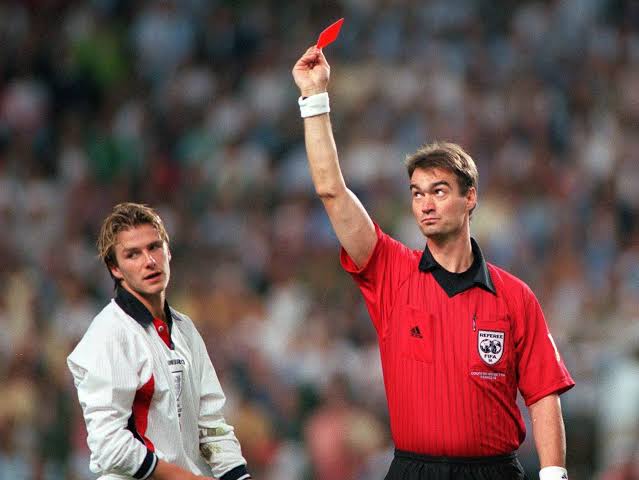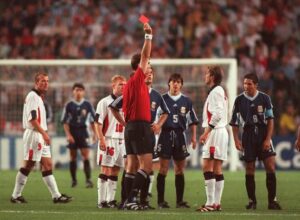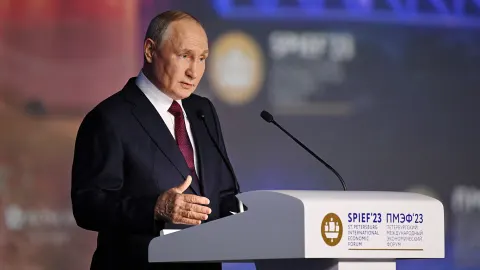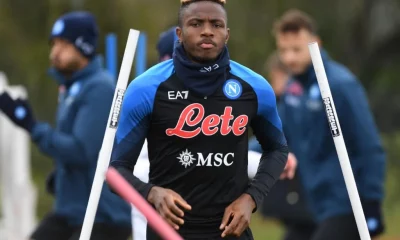Foreign
Wherever I went, people abused me every day, spat at me – David Beckham reveals how his 1998 World Cup red card still hurts

Football icon, David Beckham has laid bare the lingering pain he felt he caused his family following the red card he received at the 1998 World Cup, saying his dismissal left him a “mess.”
This was revealed in a new Netflix documentary series entitled “Beckham”, set for release on Wednesday, October 4 in which the ex-Manchester, PSG and Real Madrid midfielder looks back on his career.
Beckham, now 48 and the co-owner of MLS franchise Inter Miami, was sent off for kicking the back of Diego Simeone’s leg during a last-16 World Cup tie against Argentina.
England went on to lose the match following a penalty shoot-out, with Beckham widely blamed for the defeat with rival fans repeatedly jeering him when in action for Manchester United during the following season.
In the documentary, his wife, Victoria Beckham said the continued abuse left her husband “absolutely clinically depressed” as the then 23-year-old tried to deal with the fallout alongside becoming a father for the first time in March 1999.
Beckham admitted the abuse “took a toll on me that I never knew myself”.
He said: “I wish there was a pill you could take which could erase certain memories. I made a stupid mistake. It changed my life.

“We were in America (on holiday after the World Cup), just about to have our first baby, and I thought, ‘we will be fine. In a day or two people will have forgotten’.”
“I don’t think I have ever talked about it, just because I can’t. I find it hard to talk through what I went through because it was so extreme.
“Wherever I went, I got abused every single day — to walk down the street and to see people look at you in a certain way, spit at you, abuse you, come up to your face and say some of the things they said, that is difficult.
“I wasn’t eating, I wasn’t sleeping. I was a mess. I didn’t know what to do.”
“It brought a lot of attention that I would never wish on anyone, let alone my parents, and I can’t forgive myself for that.
“That is the tough part of what happened, because I was the one that made the mistake.
“It is only now that I am 47 years old, it is now that I beat myself up about it (still).”
Beckham’s wife also received abuse while attending football matches to support her husband.
“As horrible as it was to look up to Victoria in the stand (getting that abuse), it was the one thing which spurred me on,” he said.
But the 1998/99 season ended in triumph on the field, with a United side managed by Alex Ferguson winning a remarkable treble of the Premier League, FA Cup and Champions League, with the European triumph sealed by two stunning goals in stoppage time in the final against Bayern Munich.
Beckham’s former United and England team-mate Gary Neville, who is part of the producers of the documentary, recalled how the pair were “absolutely destroying teams” down the right flank for United.
Neville said: I was supporting him in a way which was to be fair, I would say I was a side dish really. Not the beef. I was the mustard on the side.”
Foreign
3 teens arrested in Germany for allegedly plotting terror attack

German authorities have arrested three teenagers aged 15 and 16 on suspicion of plotting a deadly Islamist terrorist attack in the western German state of North Rhine-Westphalia, prosecutors said on Friday.
The state’s Central Office for the Prosecution of Terrorism (ZenTer NRW) sought an arrest warrant for the teenagers over the Easter holiday.
They were suspected of plotting a terrorist attack in accordance with the aims and ideology of (extremist militia organisation) Islamic State.
The detained suspects are a 15-year-old girl from Dusseldorf, a 16-year-old girl from the Märkischer Kreis district and a 15-year-old boy from the Soest district, located about 100 kilometres to the east of Dusseldorf.
A fourth suspect has reportedly been identified in the south-western German state of Baden-Württemberg, and the local court there has issued an arrest warrant.
According to the investigators, the teenagers are accused of having agreed to commit murder and manslaughter.
This is in conjunction with the preparation of a serious act of violence endangering the state.
The presumption of innocence applied in all stages of the proceedings.
Security sources told newsmen that the young people had formed a chat group, but had not drawn up a concrete attack plan for a particular time and place.
However, sources said the cities of Dortmund, Dusseldorf and Cologne were discussed as targets, and attacks with knives and Molotov cocktails on people in churches or police officers in police stations had been considered.
The sources said authorities had also conducted searches as part of the investigation.
A machete and a dagger were seized in Dusseldorf, but no evidence of the construction of incendiary devices was discovered.
Sources said the father of the Dusseldorf suspect had already attracted attention from authorities in the past because he had allegedly collected donations for the Islamic State.
The investigators declined to reveal how the suspected terrorists were tracked down, but said that foreign intelligence agencies “did not play a role.”
Foreign
Putin Registers As Candidate For Russia’s Next Presidential Election

Russia on Monday officially recognised Vladimir Putin as a candidate for the presidential elections in March, a vote that he is all but certain to win.
The 71-year-old has led Russia since the turn of the century, winning four presidential ballots and briefly serving as prime minister in a system where opposition has become virtually non-existent.
The Central Election Commission said it had registered Putin, who nominated himself, as well as right-wing firebrand and Putin-loyalist Leonid Slutsky as candidates for the vote.
The election will be held over a three-day period from March 15 to 17, a move that Kremlin critics have argued makes guaranteeing transparency more difficult.
Following a controversial constitutional reform in 2020, Putin could stay in power until at least 2036.
Rights groups say that previous elections have been marred by irregularities and that independent observers are likely to be barred from monitoring the vote.
While Putin is not expected to face any real competition, liberal challenger Boris Nadezhdin has passed the threshold of signatures to be registered as a candidate.
However, it is still unclear if he will be allowed to run, and the Kremlin has said it does not consider him to be a serious rival.




















